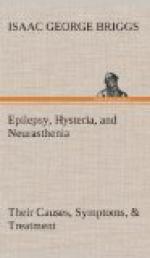Teach these children that the greatest good is not to sob over their fancied sins at “salvation” meetings, but to love the just and good, to hate the unjust and evil, and to do unto others as they would others should do unto them.
It is better for them to join one of the great churches, than become members of those small sects which maintain peculiar tenets.
A word of special warning must be given against Spiritualism. There may or may not be a foundation for this belief, but it is highly abnormal, and has led thousands into asylums.
The medium and the majority of her audience are highly neurotic, and a more unwholesome environment for an actual or potential neuropath could not be imagined.
The educated neuropath often peruses certain agnostic works, the result usually being deplorable, for this class are dependent on some stable base outside themselves, such as is found in a calm religion manifested in a steadfast attempt to overcome the weakness of the flesh, by ordering life in accordance with the teachings of the New Testament.
So long as abnormalities of character do not become too pronounced, friends must be content.
Such children must be trained to express themselves in a practical manner, not in weaving gorgeous phantasies in which they march to imaginary victory. Day dreams form one of those unlatched doors of the madhouse that swing open at a touch, the phantasy of to-day being written “emotional dementia” on a lunacy certificate to-morrow.
Finally, remember that above them hangs the curse:
“Unstable as water, thou shall not excel.”
“Go thou softly with them, all their days!” and whether your tears fall on the ashes of a loved and loving, but weak and wilful one, or whether their tears bedew the grave of the only friend they ever knew, you will not have lacked a rich reward.
* * * * *
CHAPTER XXII
DANGERS AT AND AFTER PUBERTY
“Th’ expense of spirit in
a waste of shame
Is lust in action; and till action, Lust
Is perjured, murderous, bloody, full of
blame,
Savage, extreme, rude, cruel, not to trust;
Enjoyed no sooner but despised straight;
Past reason hunted; and, no sooner had,
Past reason hated, as a swallow’d
bait
On purpose laid to make the taker mad;
Mad in pursuit, and in possession so;
Had, having had, and in quest to have,
extreme;
A bliss in proof, and proved, a very woe;
Before, a joy proposed; behind, a dream;
All this the world well knows;
yet none knows well,
To shun the Heaven that leads
men to this Hell!”
—Shakespeare.
Sonnet 129.
At puberty (from the age of 11-15) a boy becomes capable of paternity, a girl of maternity; during adolescence (from puberty to 25) the body in general, and the reproductive organs in particular, grow and mature.




